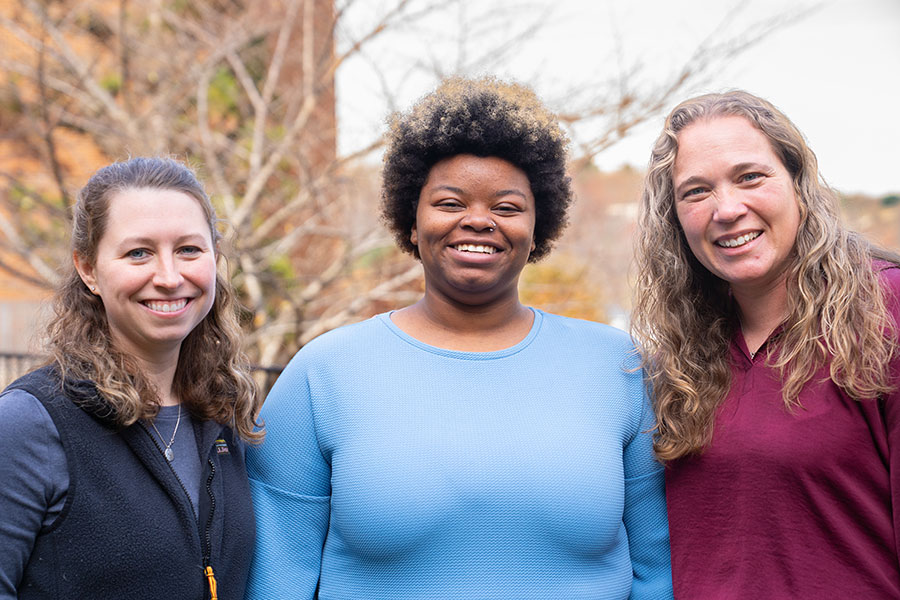Senior’s research focuses on helping Alzheimer’s, dementia patients
by Chad Osborne
November 14, 2025
Julia Miller is dedicating much of her senior year at Radford University, working alongside two Department of Psychology faculty members, to explore methods that they hope will soon help improve the quality of life for individuals living with moderate to advanced dementia.
“I knew this is something I was meant to do,” Miller said, recalling her initial meeting with Professor of Psychology Jenessa Steele, who runs the Well-Being and Engagement across the Lifespan Lab (WELL) at the university.

Miller first became involved in undergraduate research during her freshman year at Radford, working with Steele in the Highlander Research Rookies program. Three years later, she joined the important work in the WELL lab, which welcomes Radford students who are “interested in investigating how cognitive and social engagement impacts physical and mental well-being across the lifespan,” Steele said.
This year, Miller received a prestigious grant from the Office of Undergraduate Research’s Summer Undergraduate Research Fellowships, colloquially known around campus as SURF, to help further her work with her faculty mentors.
“My mentors, Dr. Clark and Dr. Steele, and I focused on establishing a trusting relationship with our local long-term care facility,” she said, explaining the work she completed for his summer SURF award. “This is important in establishing a strong foundation and ensuring that the work we do does no harm. We became more educated, made sure that IRB [institutional review board] approval was obtained with accurate detail, and set the tone for beginning steps this semester.”
In her current research, Steele, along with Assistant Professor of Psychology Michaela Clark, is engaging students like Miller while working with individuals living at a long-term care facility near Radford. The researchers are using non-pharmaceutical, everyday cognitive training interventions, such as Montessori methods and spaced-retrieval practices, to assess memory progression, engagement and indicators of physical well-being,” explained Miller, a psychology and sociology double major from South Boston, Virginia.
This process, Miller noted, involves stimulating activities and interacting with individuals.
“Participants [living at the care facilities] are working with our team of researchers with the goal of improving their procedural memories,” Miller said. “The researchers visit the participants three days a week – Monday, Wednesday and Friday – for about 30 minutes for a total of 18 sessions. Affect and engagement are coded from video, and heart rate variability is collected through a Garmin watch.”

Miller isn’t visiting the facility yet. She’ll begin work there during winter break. For now, and throughout the fall semester, she is busy coding the collected data, looking at the engagement level and affect of the participants. “For example,” she began, “are participants constructively engaging with activity, or are they passively engaged, self-engaged or non-engaged?”
The most challenging part of the research is patience, Miller said. “I have realized that conducting a complicated, applied research project with a vulnerable population is quite a large undertaking, and it requires a lot of coordination from many involved research staff, university staff and outside facility staff.”
While building patience, Miller is also fueling her passion. “I feel so ready to help,” she said.
The work is rewarding for Miller because she knows the research by Radford students and faculty is going a long way toward providing a basis for future research aimed at helping individuals with Alzheimer's and dementia. Miller said the group plans to spread the word about their research by presenting their results at the Southeastern Psychological Association meeting in New Orleans in March 2026, just two months before she is scheduled to graduate from Radford.
Participating in meaningful research, along with her involvement in Radford’s Honors College, has helped her find her place at Radford.
“Everyone here has helped me and encouraged me to make Radford University my home,” she said. “They have opened so many doors of opportunity that I would not have had otherwise. I have definitely found my place at Radford.”